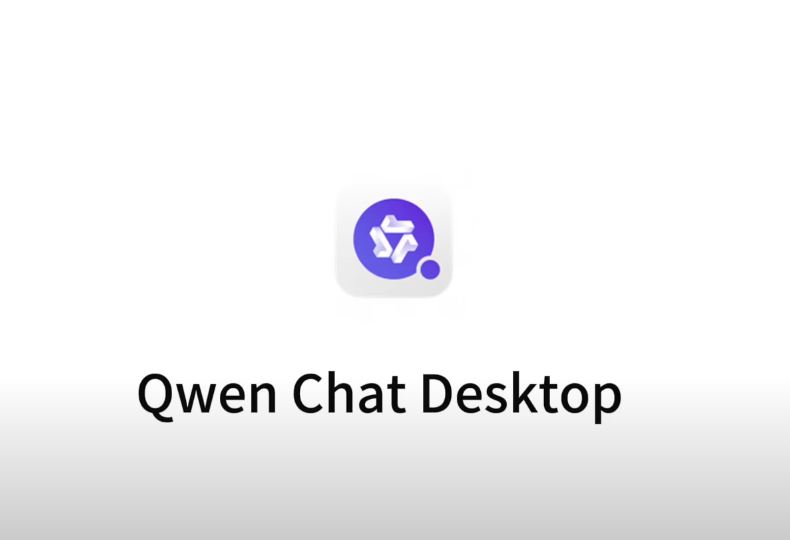Table of Contents
Overview
Qwen Chat for Desktop brings the robust capabilities of Qwen Chat directly to your local machine. This powerful desktop client, now enhanced with MCP (Model Context Protocol) support, enables seamless integration with external tools and data sources. It’s designed for users who value productivity, control, and privacy, offering a streamlined way to integrate advanced AI into their daily workflows while maintaining secure local processing capabilities.
Key Features
Moving on to what makes Qwen Chat for Desktop stand out, let’s explore its core functionalities.
- Local desktop deployment: Run Qwen Chat directly on your computer with enhanced privacy and control over your data and interactions.
- MCP server integration: Connect seamlessly with external tools and services through the standardized Model Context Protocol, enabling rich integrations with databases, APIs, and local applications.
- Enhanced workflow efficiency: Streamline your productivity through intelligent tool coordination and automated task management capabilities.
- Improved processing capabilities: Leverage optimized local processing for faster response times and more efficient task completion.
- Advanced privacy controls: Maintain full ownership and control over your data while benefiting from secure, local AI processing.
How It Works
Understanding how Qwen Chat for Desktop operates is straightforward.
Users begin by installing the Qwen Chat desktop client on their computer. The application supports MCP server integration, allowing connection to various external tools and services through a standardized protocol. This enables Claude to access file systems, databases, and APIs while maintaining security and user control. The desktop application processes queries locally where possible, with optional cloud connectivity for enhanced features and model updates. The MCP integration transforms the desktop client into a powerful hub for AI-assisted workflows, connecting seamlessly with your existing tools and data sources.
Use Cases
Given its robust capabilities, Qwen Chat for Desktop is incredibly versatile. Here are some key scenarios where it truly shines:
- Development workflows: Integrate with IDEs, version control systems, and development tools through MCP connections, streamlining coding and debugging processes.
- Business automation: Connect with CRM systems, databases, and business applications to automate routine tasks and generate insights from enterprise data.
- Research and analysis: Access document repositories, research databases, and analytical tools to accelerate information gathering and synthesis.
- Content creation: Integrate with content management systems, design tools, and publishing platforms for enhanced creative workflows.
Pros \& Cons
Every tool has its strengths and weaknesses, and Qwen Chat for Desktop is no exception. Let’s weigh its advantages against its disadvantages.
Advantages
- Powerful local processing: Experience efficient task execution with optimized local processing capabilities and responsive performance.
- Extensive tool integration: Leverage MCP support for seamless connections with a growing ecosystem of tools and services.
- Enhanced privacy and control: Benefit from local data processing with granular control over external integrations and data sharing.
Disadvantages
- Setup complexity: Initial installation and MCP server configuration may require technical knowledge, potentially challenging for non-technical users.
- Internet dependency: Many advanced features require internet connectivity, limiting fully offline functionality.
- Limited ecosystem maturity: As a newer platform, the MCP ecosystem is still developing compared to more established alternatives.
How Does It Compare?
When considering Qwen Chat for Desktop, it’s natural to wonder how it stacks up against other popular AI desktop applications.
Compared to ChatGPT Desktop, Qwen Chat for Desktop offers distinct advantages in MCP integration and local processing capabilities. While ChatGPT Desktop provides excellent cloud-based AI assistance with desktop integration features including keyboard shortcuts and file uploads, Qwen Chat emphasizes extensible tool integration through MCP. This makes Qwen Chat particularly valuable for users who need to connect their AI assistant with specific tools and workflows.
In comparison to LM Studio, which excels at running various local language models with full offline capabilities, Qwen Chat for Desktop provides a more integrated experience with cloud-enhanced features and MCP support. LM Studio is ideal for users who prioritize complete local model execution, while Qwen Chat offers a balanced approach combining local processing with cloud connectivity and extensive tool integration capabilities.
Claude Desktop provides similar MCP integration capabilities with strong privacy controls and excellent reasoning capabilities. Both applications target professional users who need sophisticated AI assistance with tool integration, though they differ in their underlying models and specific feature implementations.
Final Thoughts
Qwen Chat for Desktop emerges as a compelling solution for users seeking powerful AI capabilities with extensive tool integration. Its emphasis on MCP support, combined with local processing capabilities, positions it as a valuable tool for professional workflows and development environments. While some technical expertise may be beneficial for optimal setup and configuration, the benefits of enhanced productivity, tool integration, and privacy controls make it a worthwhile addition to your digital toolkit. For users looking to create sophisticated AI-powered workflows with extensive tool connectivity, Qwen Chat for Desktop offers significant potential for transforming how you interact with AI in your daily work.
